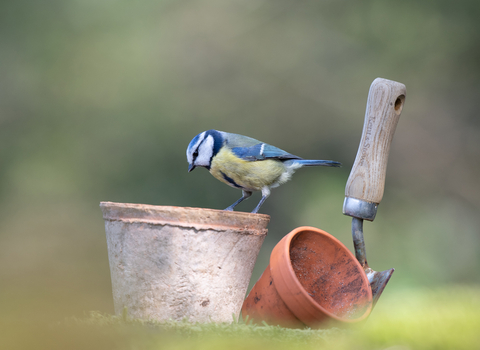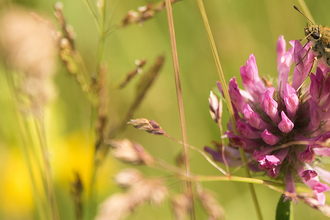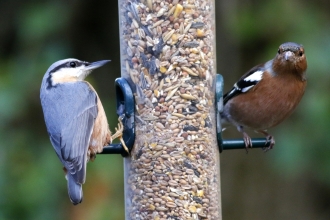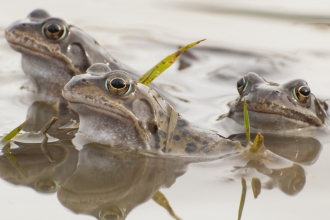To garden organically is something we all can do. It is so important for the planet and we encourage as many people as possible to take up this natural way of gardening. It’s about gardening with nature, observing and learning about wildlife in your garden to find solutions that are good for people, wildlife and the environment.
There are a few basic principles of organic gardening;
- Avoid using harmful chemicals such as pesticides, herbicides and fungicides.
- Create and maintain a healthy soil as a heathy soil is the foundation for healthy plants.
- Encourage biodiversity, by creating different habitats in your garden /allotment.
- Use resources responsibly – Reuse and recycle and be aware of where materials you buy come from. Save water and make your own fertilisers.
- Apply the model of nature – a dynamic, self-balancing and regulating system.
Alternatives to chemicals
If you want to restore wildlife in your garden, please don’t use pesticides - after all, these chemicals are intended to kill. We have some organic alternatives here below.
Weed control
- If you are about to start a new area which is full of weeds, cover it with thick layers of mulch such as cardboard or other naturally decomposing material well in advance to kill off any plants by excluding the light.
- Cover bare vegetable growing areas over winter with natural mulches or permeable groundcovers that can be re-used year after year.
- Consider growing green manures to protect and enhance the soil in a more natural way (see also point.11)
- Hand weed persistent weeds such as such as docks, bindweed, brambles, and nettles.
- Keep on top of your weeds at the beginning of the growing season before they have a chance to get out of hand. Little and often is the best method.
- Keep lightly hoeing throughout the growing season.
- Accept that some plants such as dandelions, thistles and nettles can be left in the right areas of your garden, as they are hugely beneficial to pollinators and food plants for many butterfly larvae.
- Use close spacing in your borders and vegetable patch to minimise the space for weeds to grow.
- Avoid having bare soil in your borders.
- Grow plants like Comfrey in problematic areas where weeds like couch grass are persistent, their strong growth can out compete problematic weeds like couch grass and you can use the leaves of Comfrey for so many things in the garden. (see homemade liquid feed)
- Use Allelopathy to your advantage. This method plants use to outcompete other plants can be very effective in the organic garden.
- Remember…a weed is only a plant growing in the wrong place. Control your weeds don’t eradicate them!
- Make your own homemade liquid fertiliser from nettles, comfrey, droppings or dung…and so much more!
Pests and diseases
- Don’t use chemicals! You will kill all living things, and guess which bugs will be the first to return!
- Be diverse in your garden planting, the more varieties of plants you grow (including weeds!), the more you spread the weight or lessen the impact of pests on your choice plants.
- Variety of plants and habitat is also good for attracting natural predators. Since many garden pests are low down in the food chain, they will stand less chance of thriving.
- Create many different habitats. Plant borders full of nectar for pollinators, fruit trees, native trees, meadows and hedges. Create log and stone piles and make water features such as ponds. A healthy dynamic garden has lots of inhabitants and to some degree will look after itself
- Accept that some of the pest incidence in your garden will be just that. Spring see’s lots of sappy growth and therefore lots of sap sucking bugs, but if your garden is healthy, the predators will gorge and the peak-pest-period will pass.
- Learn to see the difference between friends and foe, that way you can inspect plants and ‘squash or wash’ off potential pests.
- Inspect plants regularly, ‘one off’s’ simply doesn’t work in the garden, and if you catch things early you can have a big impact
- Feed birds in your garden, as they will feast on your blackfly and aphids while waiting their turn at the feeders.
- Companion planting
- Resistant varieties
- Organic alternatives. Garlic is a miracle worker!
Slug control
- If you have a lot of slugs and snails choose plants that they do not like such as such as Aquilega, Bugle, Cranesbills geranium, Lavenders, Stachys, Rosemary, Foxglove, Sedums and more.
- Put barriers around your plants that they don’t like to cross such as slate waste, grit, coffee granules, wool or crushed shells. Products such as mineralised straw can be very effective.
- Plant a few extra ‘sacrificial’ plants in your borders or vegetable plot.
- Collect slugs that congregate under wooden planks used as paths in an allotment garden.
- Slug traps with beer or yeast extract in them -make sure the edges are slightly raised above the ground to avoid ground beetles and other beneficial insects falling in.
- Encourage frogs and toads to your garden as they are excellent ‘slug controllers’ so think of creating a pond or wet area. Ducks and geese are also a very good consideration for slug control.
- Strong, healthy plants tend to be left alone, ensure your plants are in good condition and are planted out at the correct time. Strong growth will get away from such pests; consider also nourishing the health of your soil for more long-term plant health and pest resilience.
Stop using peat
Peat based compost needs to be a thing of the past! Peat used in our compost is dug out of wild places, damaging some of the last remaining peatlands in the UK and overseas. You can find out more about this here or see below for ways you can reduce the use of peat in your garden.
How to go peat-free
The best alternative by far is to make your own compost. It’s not difficult, and is an absolutely essential part of any organic garden. However, if you haven’t got your own compost, the quality of peat-free products has improved over the years and there are good quality peat free composts available to buy. Make sure you only buy what you need for each season as it doesn’t keep well from year to year.
Here are some ideas of how you can make different compost mixes depending on the end use:
- Potting-up compost for potting on seedlings
Mix well broken-down leaf mould, garden compost and loam (soil). -
Potting up compost for larger, more established plants.
Add extra nutrients to the above mix in the form of well-rotted manure or worm compost. - Compost for seeds
This is more challenging, and might be worth buying to make sure it is free of unwanted seeds or disease. But if you want to make it, use well-rotted leaf mould which is low in nutrients. This is best mixed 1:1 with coir if you can get hold of it.
Leaf mould can be made by putting your leaves in a pile, in a large bag or a netted-off-corner from where the leaves won’t blow away. Leave for a year or more and you will have the most beautiful soil improver. It is low in nutrients and can be mixed as suggested to make the perfect mixes.
Perlite, vermiculite horticultural sand or grit can be added to lighten up your compost and make it more free draining.
Responding to changes in the weather
With the weather set to become ever more erratic with flash floods and extended periods of drought, building your gardens water resilience has never been so important.
Managing natural resources
- Water Butts / tanks: invest some time and a little money in saving rainwater…it is worth every drop! Better for your plants.
- Right plant in the right place. If you have free draining soil or a dry part of the garden then it’s worth looking into plants that can withstand periods of drought, often originating in hotter regions such as the Mediterranean or alpine plants that can survive with little watering.
- Mulching is one of the best ways to conserve moisture in your soil, it also protects bare soil from the elements, and if you use and organic mulch it slowly breaks down and incorporated by the worms. Mulching also helps win the battle with weeds!
- Grow lots of ground cover around the base of your plants such as herbs e.g. Turkish rocket.
- Don’t bother watering an established lawn…grass has an amazing capacity to grow back when the rains return.
- Seed saving – year on year will develop plants that are more adapted to your garden and be more able to ride out extremes of weather.
- Go ‘No Dig’: this gardening method has many benefits. Undug soil offers at the very least an enhanced, more robust structure than a segmented, broken up loam which is less resilient to weather extremes.
- Garden organic has a good website if you want to find out more about climate change gardening.
Reduce, reuse, recycle
Gardeners are thrifty, imaginative and creative by nature. Here below we have some tips on how you can reduce consumption in your garden.
Tips on DIY ways to help save the planet
- Repurposing household objects for use in the garden is a great way to extend the life of materials with embedded energy.
- Go plastic free or if there is no other option, buy good quality long lasting products e.g strong seed trays.
- Homemade, there are plenty of ideas to be found on-line.
- Look at how much waste you produce in your garden and one by one eliminate them.
- Make your own compost.
Adhering to organic gardening principles is essential for anyone who gardens for the benefit of wildlife. There’s no short term thinking here, we see our gardens as dynamic, mini and micro habitats that form stepping stones in the wider landscape.







